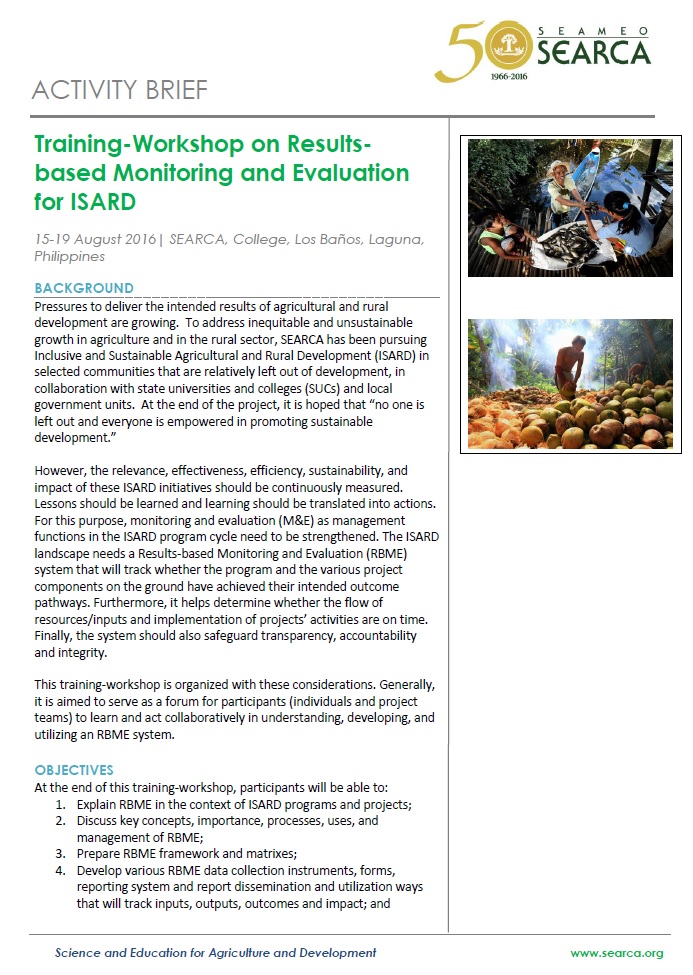Training-Workshop on Results-based Monitoring and Evaluation for ISARD
Pressures to deliver the intended results of agricultural and rural development are growing. To address inequitable and unsustainable growth in agriculture and in the rural sector, SEARCA has been pursuing Inclusive and Sustainable Agricultural and Rural Development (ISARD) in selected communities that are relatively left out of development, in collaboration with state universities and colleges (SUCs) and local government units. At the end of the project, it is hoped that “no one is left out and everyone is empowered in promoting sustainable development.”
However, the relevance, effectiveness, efficiency, sustainability, and impact of these ISARD initiatives should be continuously measured. Lessons should be learned and learning should be translated into actions. For this purpose, monitoring and evaluation (M&E) as management functions in the ISARD program cycle need to be strengthened. The ISARD landscape needs a Results-based Monitoring and Evaluation (RBME) system that will track whether the program and the various project components on the ground have achieved their intended outcome pathways. Furthermore, it helps determine whether the flow of resources/inputs and implementation of projects’ activities are on time. Finally, the system should also safeguard transparency, accountability and integrity.
This training-workshop is organized with these considerations. Generally, it is aimed to serve as a forum for participants (individuals and project teams) to learn and act collaboratively in understanding, developing, and utilizing an RBME system.
OBJECTIVES
At the end of this training-workshop, participants will be able to:
1. Explain RBME in the context of ISARD programs and projects;
2. Discuss key concepts, importance, processes, uses, and management of RBME;
3. Prepare RBME framework and matrixes;
4. Develop various RBME data collection instruments, forms, reporting system and report dissemination and utilization ways that will track inputs, outputs, outcomes and impact; and
5. Discuss how to sustain an RBME system for ISARD programs/projects.
MODULES
The training-workshop comprises five modules. The first module reviews the existing ISARD M&E. Then, it discusses the what, why, for whom, when, and how of RBME and locates RBME in the ISARD program/project cycle management. After discussing RBME in the context of ISARD process, Module 2 focuses on setting the core purposes, scope, stakeholders, and organization and management for ISARD RBME. Module 3 centers on the discussion and construction of ISARD results and logical frameworks. It also covers a discussion of the RBME plan or schedule and the target/performance tracking matrix. Module 4 deals with how to operationalize the framework, data collection tools, data management, reporting, learning and action, and report dissemination and utilization. Finally, Module 5 tackles the sustainability of the ISARD system.
APPROACHES AND METHODS
This training-workshop will use a variety of adult learning methods. It has three lecture-discussions and Q&A to explain concepts, approaches, strategies and processes. It will also make use of workshops and buzz sessions to develop the skills of the participants in the use of different tools discussed in the course. Participants will present their workshop outputs in plenary sessions, intended to promote exchange of ideas to assess and to suggest improvements to these outputs.
Participants will develop their re-entry plans to get their commitment in using their learning from this course. Finally, organizers will administer a pre-test and post-test exercise to gauge improvement in individual knowledge on RBME.

